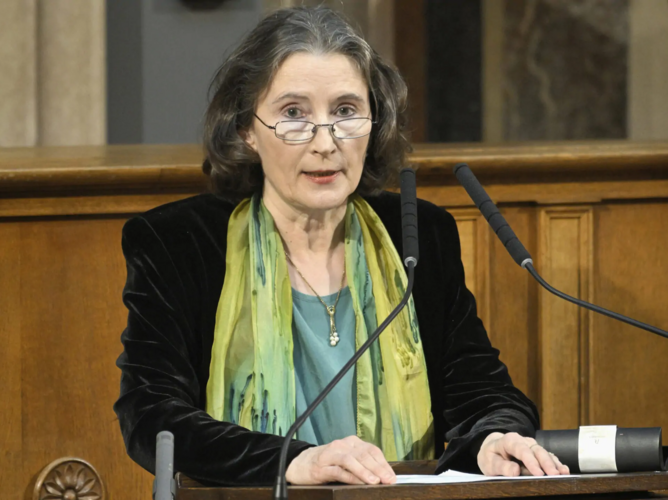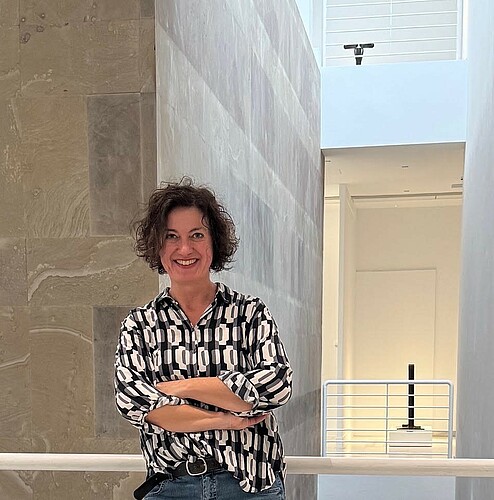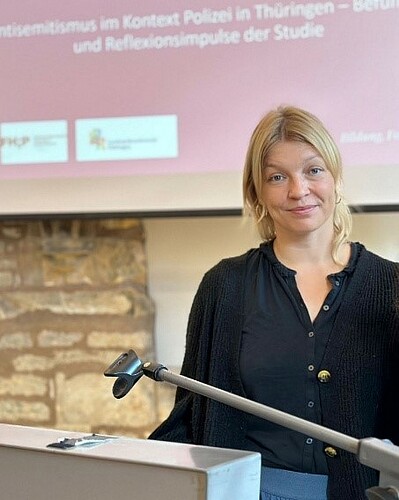Events, exhibitions, performances, concerts, and artistic projects
Here, we present various formats that not only provide significant impulses and strengthen the dialogue on antisemitism but also demonstrate how creative, interactive and scientific approaches can foster a deeper understanding of the complex societal challenges associated with addressing antisemitism, while supporting long-term prevention efforts.
Jewish Art School Berlin
The Institute for New Social Sculpture, in cooperation with the Berlin University of the Arts and the Jewish Student Union of Germany, is founding the Jewish Art School Berlin (JKB). This institution offers Jewish and antisemitism-critical students and young adults an innovative platform for artistic development and critical engagement.
The JKB is led by internationally renowned artists such as Victoria Hanna, David Adika, and Yehudit Sasportas. Through masterclasses and workshops spanning various disciplines—from performing to visual arts—Jewish and antisemitism-critical students and young adults will be supported in their artistic growth.
The collaboration with the University of the Arts Berlin (UdK Berlin) further supports the project.
OPEN CALL Jewish Art School 2026 Application I Deadline: March 29, 2026
The Institute for Neue Soziale Plastik is, for the third time this year, announcing places for the Masterclasses at the Jewish Art School.
In 2026, the Jewish Art School will focus on the Performing Arts, though not exclusively. Yasmeen Godder und Itzik Giuli will lead a Dance and Performance Masterclass, members of the Noa Eshkol Foundation will delve into her work and the Eshkol-Wachman Notation; Drag and Queer Performance Practices will be explored with Shlomi Moto WagnerMati Shemoelof will offer a Creative Writing Masterclass, and Nir Evron will run a hands-on Masterclass in Media Arts.
The application deadline is 29th March 2026. More information can be found here.
The Jewish Art School was founded with the goal of creating safe spaces for art production and long-term networks for Jewish and anti-antisemitism-critical artists and performers. The call is open to Jewish, Israeli, and non-Jewish individuals interested in Jewish perspectives (young adults up to the age of 39). The Masterclasses will be led by internationally renowned artists and offer targeted support and intensive exchange. They will take place in the summer of 2026 and are free of charge.
Lecture Series at UdK Berlin: Antisemitism at Universities – Reality, Reflection, Reaction
This lecture series provided a space for in-depth reflection and constructive exchange on antisemitism. Antisemitism is also a reality at universities—whether in academic debates, student initiatives, or everyday campus life. The series “Antisemitism at Universities – Reality, Reflection, Reaction” examined current scholarly perspectives on the topic and presented both analytical and practice-oriented approaches to combating antisemitic patterns of thought and behavior.
The series opened with a lecture on the empirical study of antisemitism: When is it Antisemitism? Academic Answers to a Frequently Asked Question (Prof. Dr. Dr. h.c. Monika Schwarz-Friesel, TU Berlin). This was followed by Antisemitism and Intersectionality: Critique and New Perspectives (Prof. Dr. Karin Stögner, University of Passau).
Practical strategies for documenting and combating antisemitism were the focus of the third event: The Research and Information Office on Antisemitism (RIAS Berlin) and Mobile Counseling Against Right-Wing Extremism (MBR Berlin) presented civil society approaches addressing the documentation of antisemitic incidents, support for those affected, and dealing with antisemitism in universities and cultural institutions.
Workshop: Antisemitic Incidents in Berlin with a Focus on Universities by Julia Kopp (RIAS Berlin) and Matthias Müller (MBR Berlin).
The series concluded with an analysis of the impact of October 7, 2023, on Jewish and Israeli communities in Germany. The lecture Antisemitism in the Institutional University Context – Traditions, Blind Spots, and Current Research examined how antisemitism has changed in everyday university life before and after this date and the challenges that have emerged as a result (Prof. Dr. Friederike Lorenz-Sinai, University of Applied Sciences Potsdam).
The lecture series was organized by Dr. Michaela Conen, Process Coordinator for Antisemitism Prevention at the Berlin University of the Arts (UdK), with support from the MFFB. Below you will find the recorded online lectures.
Lecture from May 12, 2025: When Is It Antisemitism? Scholarly Answers to a Frequently Asked Question
For years, claims such as "there is not enough research yet" or "we lack a precise scientific definition of antisemitism" have shaped the discourse and debates surrounding contemporary antisemitism. In this way, the extensive existing research on the topic is overlooked, and the much-needed enlightenment, as well as the societal fight against the growing hatred of Jews, is deferred to an indefinite future. In this lecture, using data-rich and scientifically validated findings from both historical and contemporary empirical research, the question of what antisemitism is (and what it is not), how it manifests, and how to recognize and deconstruct antisemitic attitudes will be discussed.
Link to the online presentation
Prof. Dr. Dr. h.c. Monika Schwarz-Friesel
Prof. Dr. Dr. h.c. Monika Schwarz-Friesel, expert on antisemitism and cognitive scientist at the Technical University of Berlin; Chair at the Institute for Language and Communication. Her book publications include: Contemporary Antisemitism, a Phenomenon of the Center, Educated Antisemitism, The Language of Antisemitism in the 21st Century, Antisemitism on the Internet, Toxic Language and Mental Violence: How Antisemitic Thought and Emotional Patterns Have Shaped Our Communication for Centuries.
Lecture from May 19, 2025: Antisemitism and Intersectionality. Critique and New Perspectives
After October 7, it became clear that antisemitism is a significant gap within much of intersectional feminism. This reached a point where Jewish people and Israelis were denied intersectional solidarity. In a new approach to intersectional ideological critique, the lecture will analyze the interconnections between antisemitism, racism, and sexism.
Link to the online presentation.
Prof. Dr. Karin Stögner
Prof. Dr. Karin Stögner is a Professor of Sociology at the University of Passau. She is the author of Antisemitism and Sexism: Historical-Social Constellations (Nomos 2014) and co-editor of Critical Theory and Feminism (Suhrkamp 2022).
Lecture from June 4, 2025: Antisemitism in the Institutional Context of Universities – Traditions, Gaps, and the State of Research
In this lecture, the question will be explored of how antisemitism manifests in the institutional everyday life of universities both before and after October 7, and how it impacts Jewish and Israeli communities in Germany. The lecture will address societal traditions in dealing with Jews and antisemitism in contemporary society, introducing the analytical category of institutional antisemitism. It will then present and discuss findings from current studies on experiences of antisemitism in the university context.
Link to the online presentation.
Prof. Dr. Friederike Lorenz-Sinai
Prof. Dr. Friederike Lorenz-Sinai is a Professor of Social Work Methods and Social Work Research at the University of Applied Sciences Potsdam. Her research focuses on the processing of (sexualized) violence, everyday experiences in the prison system and perceptions of prison architecture, institutional antisemitism, as well as the impact of October 7, 2023, on Jewish and Israeli communities in Germany. Together with Marina Chernivsky, she co-leads a research area at the Competence Center for Antisemitism-Critical Education and Research. Current publications, each co-authored with Marina Chernivsky, include: Institutional Antisemitism as an Analytical Category – Traditions, Findings, and Research Gaps (2025); Analysekategorie institutioneller Antisemitismus“How come you don’t say anything when Jewish women are raped?” – Sexualized Violence in the Context of October 7 from Jewish Perspectives in Germany (2025), in: Glöckner, Olaf/Jikeli, Günther (eds.): Antisemitism in Germany After October 7. Georg Olms Verlag: Hildesheim; October 7 as a Turning Point for Jewish Communities in Germany (2024), Der 7. Oktober als Zäsur für jüdische Communities in Deutschland in: APuZ - Aus Politik und Zeitgeschichte: Antisemitismus, 74th year, 25-26 2024, pp. 19-24.


